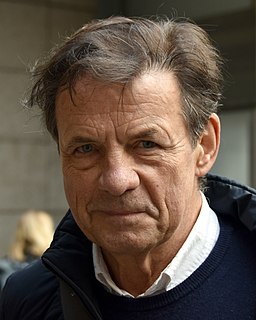A Quote by Guy Davenport
My view, as one who taught it, is that the whole purpose of a literary education should be to tell people that these things exist. I don't think any teacher should try to 'teach an author,' but rather simply describe what the author has written. And this is what I tried to do.
Related Quotes
Reading a book should be a conversation between you and the author. Presumably he knows more about the subject than you do; if not, you probably should not be bothering with his book. But understanding is a two-way operation; the learner has to question himself and question the teacher, once he understands what the teacher is saying. Marking a book is literally an expression of your differences or your agreements with the author. It is the highest respect you can pay him.
In fact I don't think of literature, or music, or any art form as having a nationality. Where you're born is simply an accident of fate. I don't see why I shouldn't be more interested in say, Dickens, than in an author from Barcelona simply because I wasn't born in the UK. I do not have an ethno-centric view of things, much less of literature. Books hold no passports. There's only one true literary tradition: the human.
It has been the error of the schools to teach astronomy, and all the other sciences, and subjects of natural philosophy, as accomplishments only; whereas they should be taught theologically, or with reference to the Being who is the author of them: for all the principles of science are of divine origin. Man cannot make, or invent, or contrive principles: he can only discover them; and he ought to look through the discovery to the Author.
The two important facts I should say, are emotion, and then words arising from emotion. I don't think you can write in an emotionless way. If you attempt it, the result is artificial. I don't like that kind of writing. I think that if a poem is really great, you should think of it as having written itself despite the author. It should flow.
If I focused hard on getting a literary agent, and doing things like that, instead of designing my blog's header, I would have more money, I think. I think I don't view myself as an author. I view myself as a person. I view [anything] as part of being a person, so I feel okay with "marketing" or other things like that.
I think evolution should be taught as an accepted principle. I say that also as the daughter of a school teacher, a science teacher, who has instilled in me a respect for science. I think it should be taught in our schools. I won't ever deny that I see the hand of God in this beautiful creation that is earth. But - that is not a part of state policy or a local curriculum in a school district. Science should be taught in science class.
No matter what our job is, we view it not as our purpose in life but rather as where God has sovereignly placed us for the purpose of making Christ known and his name great. If you are a teacher, if you are a politician, if you are a businessman, if you are in agriculture, if you are in construction, if you are in technology, if you are in the arts, then you should not be saying, ‘I need to find my life’s purpose in this work,’ but rather, ‘I need to bring God’s purpose to this work.’
I think, however, that there isn't any solution to this problem of education other than to realize that the best teaching can be done only when there is a direct individual relationship between a student and a good teacher - a situation in which the student discusses the ideas, thinks about the things, and talks about the things. It's impossible to learn very much by simply sitting in a lecture, or even by simply doing problems that are assigned. But in our modern times we have so many students to teach that we have to try to find some substitute for the ideal.






































